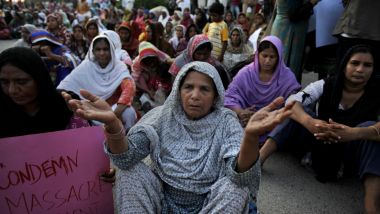Religious terror 'on the increase', Christians are the main victims

Religiously-inspired terror is on the increase throughout the world, according to a major new report compiled by Roman Catholic agency Aid to the Church in Need (ACN) – and Christians are "by far" the most persecuted faith group.
The Religious Freedom in the World 2014 report was launched yesterday backed by a video presentation by Prince Charles.
In a bleak assessment of the situation, it says that of the 196 countries in the world, 81 (41 per cent) are places where religious freedom is impaired or is in decline. A total of 35 countries (18 per cent) are just as being "of concern".
The report found that "Where there has been a change concerning religious freedom, that change has almost always been for the worse." In the 196 countries analysed, change for the better is noted in only six countries.
Deteriorating conditions are recorded in 55 countries (or 28 per cent).
There are 20 countries classed as "high" with regard to a lack of religious freedom, 14 of them experiencing persecution linked to extremist Islam and persecution in the remaining six – Burma, China, Eritrea, North Korea, Azerbaijan and Uzbekistan – linked to authoritarian regimes.
The report also says that religious freedom is in decline in Western countries that are predominantly or historically Christian and that "religious tension is rising, provoked by the recent phenomena of 'aggressive atheism', liberal secularism and the rapid influx of economic migrants and refugees with a faith and culture markedly different from the host country."
It claims that "The religious illiteracy of Western policy makers is creating a formidable barrier of understanding between the West and other parts of the world. The Western interventions in Iraq and Afghanistan are two cases where this lack of sympathy, or religious understanding, is all too apparent."
The ACN report also says that poor understanding of the context of conflicts in secular media reports of violence means that "The audience is left with the sense that the events recorded are random acts of cruelty committed by deranged gunmen." Consequently, "Communities of religious believers are, according to this secular media interpretation, increasingly a problem to be managed, and even marginalised, rather than a tradition to be encouraged and supported. The view is gaining ground in the West that religion, rather than bringing out the best in humanity, engenders its worst aspects."
While in the West religious oppression is low, it says that there are "genuinely worrying tendencies". "Chief among these developments is that while increasingly mainstream Western opinion rightly regards discrimination on the grounds of race, gender and sexuality as unacceptable, there is at the same time a declining consensus on the rights of conscience of religious believers.
"Especially with regard to subjects such as faith schools, homosexual marriage and euthanasia, there is a growing conflict between traditional religious views and the 'progressive' liberal consensus. While mainstream opinion concedes that believers should, as a minimum, be free to practise their faith in private, there is less and less agreement on how far that faith should be permitted to manifest itself in the wider society."
The report adds: "It is hoped that this report can prompt greater reflection on the core precepts of religious freedom, especially how far faith groups should be permitted to legally dissent from prevailing norms."
Christians are by far the most persecuted faith group, partly because they are frequently in minority communities in cultures very different from their own. In each of the 20 high-persecution countries, Muslims are also persecuted, in most cases at the hands of other Muslims. Jewish communities also face violence, prompting record levels of migration to Israel.
ACN commissioned experts in religious freedom to report on different parts of the world. Former missionary José Carlos Rodríguez Soto is "generally optimistic" about religious freedom in Africa, whereas Father Bernardo Cervellera, Editor of Asia News, claims that, over the past two years, "Asia continues to be the continent where religious freedom is violated the most".
However, the report says that there are "signs of hope as well as reasons for grave concern", for example in the donation by a Muslim ruler of land for a Christian cathedral.
It concludes: "The clear lesson from this research is that the urgent call to reverse the violence and oppression directed towards religious minorities must come, first and foremost, from within religious communities themselves.
"Though this report highlights the many legal and constitutional impediments to religious liberty imposed by governments, the precondition for improvement is harmony and mutual respect between religious groups.
"The necessity for all religious leaders to use their pulpits and the media to loudly proclaim their opposition to religiously-inspired violence, and to re-affirm their support for religious tolerance, is becoming – in the present climate – ever more urgent."











